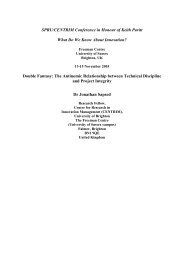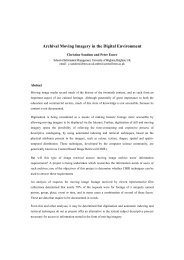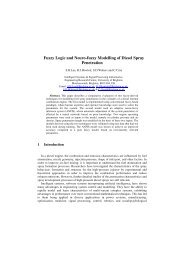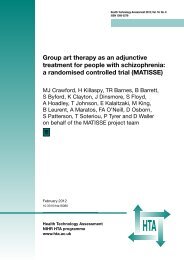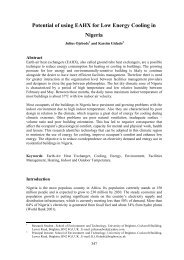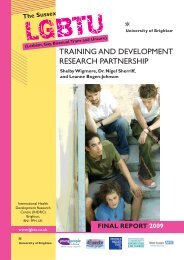TOP TIP - University of Brighton Repository
TOP TIP - University of Brighton Repository
TOP TIP - University of Brighton Repository
You also want an ePaper? Increase the reach of your titles
YUMPU automatically turns print PDFs into web optimized ePapers that Google loves.
In relation to young fathers, recent national policy frameworks such as the<br />
National Service Framework (NSF) for Children, Young People and Maternity<br />
Services have emphasised the need for greater engagement with young fathers by<br />
pr<strong>of</strong>essionals. Similarly, the Social Exclusion Unit’s (2005) report Transitions,<br />
Young Adults with Complex Needs acknowledges the need for improved<br />
assessments <strong>of</strong> the needs <strong>of</strong> young fathers. In September 2006, the Department<br />
for Education and Skills (DfES) published ‘Teenage Pregnancy: Accelerating the<br />
Strategy to 2010’ which announced that the DfES would be issuing guidance on<br />
all aspects <strong>of</strong> delivering support for teenage parents for local authorities in early<br />
2007 as well as the present publication on promising practice on supporting<br />
young fathers. In relation to young fathers, it is envisaged that the forthcoming<br />
guidance will look at how maternity services and Children’s Centres can be<br />
better tailored to meet the needs <strong>of</strong> young fathers. Moreover, it will also look<br />
specifically at how young fathers can be supported to engage in education,<br />
employment and training and how best to support them to take greater<br />
responsibility for contraception (over which male partners can have a strong<br />
influence) to help reduce second and subsequent unplanned pregnancies.<br />
The benefits <strong>of</strong> young fathers work<br />
Work with fathers is important because they make a particular contribution to<br />
their children’s development and family life. Men’s involvement in family life is<br />
changing, and whether resident or not, fathers have a significant role to play in<br />
the development and well-being <strong>of</strong> their children (Lamb, 2004; Lewis and Lamb,<br />
in press; Lloyd et al., 2003; Warin et al., 1999). Research confirms that fathers<br />
can have a substantial impact in terms <strong>of</strong> both positive and negative outcomes<br />
for their children (Cawson et al., 2000; Lamb, 2004; Lamb and Lewis, 2004;<br />
Lloyd et al., 2003), and has also highlighted the need to support young and<br />
vulnerable fathers in the involvement with their children (e.g. Mordaunt, 2005).<br />
For example, evidence suggests that children do better among separated families<br />
when there is close and positive contact with both parents (e.g. Amato et al.,<br />
1999). Moreover, high levels <strong>of</strong> positive father involvement in two parent<br />
families is associated with a range <strong>of</strong> desirable educational, social and emotional<br />
outcomes for children and young people (e.g. Flouri, 2005). These include<br />
including better examination results, better attendance and behaviour, less<br />
criminality and substance abuse, better peer relationships, higher self-esteem and<br />
confidence, and better mental health. Furthermore, studies have found that when<br />
fathers are involved with their children at age seven, this can act as a protective<br />
factor in relation to education, crime, mental health, and homelessness. Once<br />
fathers are involved, they are also more likely to remain so (Flouri, 2005; Welsh<br />
et al., 2004).<br />
However, it is important to acknowledge that an increased level <strong>of</strong> father<br />
involvement is not always positive. For example a range <strong>of</strong> negative<br />
developmental outcomes for the child have been associated with some fathers’<br />
poor or neglectful parenting, anti-social behaviour, and substance abuse.<br />
Whether a positive or negative influence, what is clear is that everything a father<br />
does impacts on the child, and as Burgess (2006b) points out, although negative<br />
behaviour by some fathers could be seen as an impetus to exclude men from<br />
family services and support programmes, the alternative view is that such<br />
behaviours actually accentuate the need to work with fathers in public services.<br />
The recognition that parenting matters (mothering and fathering), and is an<br />
important and critical influence on a child’s life, has been stated explicitly in the<br />
government’s 2003 Green Paper Every Child Matters (ECM). In section three <strong>of</strong><br />
INTRODUCTION<br />
Supporting Young Fathers 5





